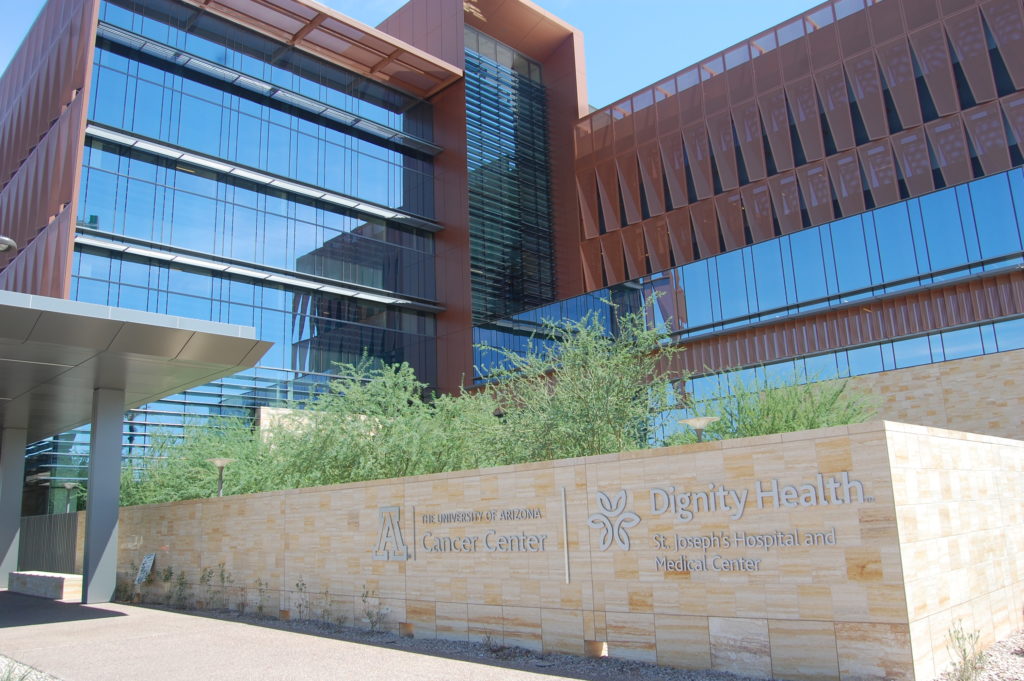Advancing its commitment to patient-centered care, the University of Arizona Cancer Center at Dignity Health St. Joseph’s Hospital and Medical Center recently launched a multidisciplinary thoracic clinic.

University of Arizona Cancer Center at Dignity Health St. Joseph’s Hospital and Medical Center – Photo by AZBio
The sophistication and complexity associated with many forms of cancer often require an intricate level of care coordination, leaving patients vulnerable to misinformation and lack of communication that can have negative effects on treatment and experience.
The advancement of this new initiative means that patients who have been diagnosed with cancers of the lung, stomach and esophagus will be paired with a dedicated team of physicians and health-care professionals who are experts in their specialties. Service providers for each patient will include a radiation oncologist, medical oncologist, surgical oncologist, social worker, nurse navigator, dietician and a genetic counselor.
 “This new multidisciplinary clinic will give our patients the most comprehensive access to all aspects of the care team,” said Panayiotis Savvides, MD, section leader for Head and Neck and Thoracic Medical Oncology at the UA Cancer Center at Dignity Health St. Joseph’s Hospital and Medical Center. “Cancer care can be a complicated process, and our goal is to make it as easy as possible for patients and their support teams to navigate that road.”
“This new multidisciplinary clinic will give our patients the most comprehensive access to all aspects of the care team,” said Panayiotis Savvides, MD, section leader for Head and Neck and Thoracic Medical Oncology at the UA Cancer Center at Dignity Health St. Joseph’s Hospital and Medical Center. “Cancer care can be a complicated process, and our goal is to make it as easy as possible for patients and their support teams to navigate that road.”
Patients will interact with multiple specialists during a single visit, where information is exchanged, care options are developed and the patient is presented with a comprehensive plan for the treatment and management of their specific diagnosis. The goal is for the patient and their family or partner to be better informed and feel a greater level of connection to their care, as well as to their care team. Patients also will have an opportunity to meet with the research team and see if any open clinical trials are available to them.
Multidisciplinary clinics in cancer care emerged in response to a changing medical landscape: care  management became more long-term and complex as clinical understanding of cancer biology grew and therapies improved, and clinicians became more specialized, increasing their level of knowledge and care capacity. However, patients then had to navigate a more complicated environment in an already challenging setting. Building a team of specialists around the patient and taking a multidisciplinary approach ensured that clinical navigation, communication and decision-making were coordinated and involved the entire team at every stage of care.
management became more long-term and complex as clinical understanding of cancer biology grew and therapies improved, and clinicians became more specialized, increasing their level of knowledge and care capacity. However, patients then had to navigate a more complicated environment in an already challenging setting. Building a team of specialists around the patient and taking a multidisciplinary approach ensured that clinical navigation, communication and decision-making were coordinated and involved the entire team at every stage of care.
At the new multidisciplinary thoracic clinic at the UA Cancer Center at Dignity Health St. Joseph’s Hospital and Medical Center, members of the care team will meet prior to the patient’s first appointment in what is known as a “tumor board,” a meeting in which the patient’s case is presented to the group and diagnosis, treatment and clinical trial options are discussed. Each patient is assigned a private room where a surgeon, radiation oncologist and medical oncologist rotate through. Between physician appointments, patients meet with social workers and dieticians. While patients are having lunch, the clinical team meets to discuss relevant information and define an optimal treatment strategy. Before the exit briefing, physicians meet with the patient to discuss the recommended treatment option and provide additional education.
“The multidisciplinary thoracic clinic is one of the distinctive services we offer,” said Marcia Gruber-Page, vice president for oncology services at the UA Cancer Center at Dignity Health St. Joseph’s Hospital and Medical Center, which opened a new 220,000-square-foot outpatient clinic in downtown Phoenix in August 2015. “Next steps will include rolling out other disease-specific multidisciplinary clinics,” Gruber-Page added.
More information on the Thoracic Cancer Program at the UA Cancer Center at Dignity Health St. Joseph’s Hospital and Medical Center can be found at dignityhealth.org/arizona/locations/stjosephs/services/cancer-care/cancer-programs/thoracic-cancer
About the University of Arizona Cancer Center
The University of Arizona Cancer Center is the only National Cancer Institute-designated Comprehensive Cancer Center headquartered in Arizona. The UACC is supported by NCI Cancer Center Support Grant No. CA023074. With primary locations at the University of Arizona in Tucson and at St. Joseph’s Hospital and Medical Center in Phoenix, the UACC has more than a dozen research and education offices in Phoenix and throughout the state and 300 physician and scientist members work together to prevent and cure cancer. For more information, please go to uacc.arizona.edu
About Dignity Health
Dignity Health, one of the nation’s largest health-care systems, is a 21-state network of more than 9,000 physicians, 62,000 employees and 400 care centers, including hospitals, urgent and occupational care, imaging centers, home health and primary care clinics. Headquartered in San Francisco, Dignity Health is dedicated to providing compassionate, high-quality and affordable patient-centered care with special attention to the poor and underserved. For more information, please visit dignityhealth.org. You also can follow us on Twitterand Facebook.
